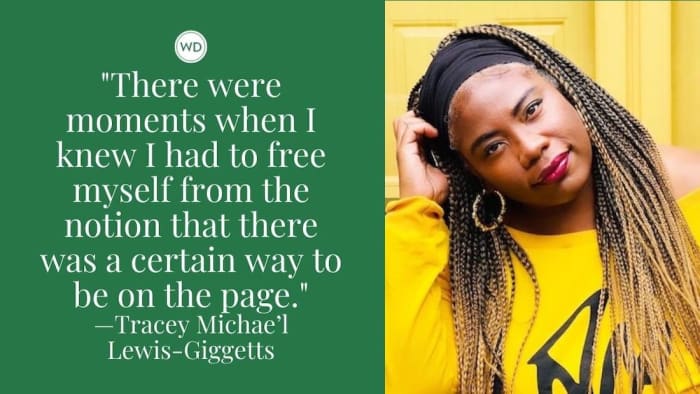Tracey Michae’l Lewis-Giggetts: On Intentional Expressions of Black Joy
Tracey Michae’l Lewis-Giggetts is the author of 18 books, and the host of the podcast HeARTtalk with Tracey Michae’l. Her writing has appeared in a variety of publications, including The Washington Post, Essence, Oprah Daily, and more. Find her on Twitter, Facebook, and Instagram.
In this post, Tracey discusses how exploring personal joy led her to write her new essay collection, Black Joy, how the writing process for this changed how she’ll approach future projects, and more!
Name: Tracey Michae’l Lewis-Giggetts
Literary agent: Cait Hoyt
Book title: Black Joy
Publisher: Gallery Books
Expected release date: February 1, 2022
Genre/category: Essay collection
Elevator pitch for the book: Black Joy: Stories of Resistance, Resilience, and Restoration is a collection of 36 intimate, personal essays that will not only demonstrate the nuances and complexities of Black joy— how it’s been an ever-present but often hidden stabilizer for me personally—but will also show how joy survives and thrives even while living above, beneath, and alongside the trauma that comes with living in the Black body.
IndieBound | Bookshop | Amazon
[WD uses affiliate links.]
What prompted you to write this book?
My therapist had me doing exercises where I’d try to access the actual feeling of joy in my body. There were so many moments when I couldn’t do it and I became curious as to why. My exploration took me to not just my personal story of trauma, but also my cultural experiences as a Black woman in this country.
I ended up writing an essay for the Washington Post about Black joy as resistance, specifically in the parenting context, and that ultimately led to more essays and this collection.
How long did it take to go from idea to publication? And did the idea change during the process?
I think the initial idea was actually just an ever-evolving set of understandings about myself. About how race and racism functions in the daily lives of Black people. These ideas had been marinating for a few years before I actually sat down to write about them. From that point to publication was about two years.
Were there any surprises or learning moments in the publishing process for this title?
I’m not sure if there were any surprises as much as there were moments when I knew I had to free myself from the notion that there was a certain way to be on the page. This book really does present an authentic picture of who I am and this publication process—having people read those words over and over; and sometimes critique them—taught me that it was okay to be exactly who I am, flaws and all.
Were there any surprises in the writing process for this book?
I’m the type of person who generally has three or four “irons in the fire” at any given point in time. I’m always multitasking. Yet, I was very intentional in NOT doing that with this book. I gave this project all of my energy instead of spreading myself thin with other freelance work.
I was definitely surprised by how well that kind of intentional focus served the stories I was telling. It provided a model for how I plan to approach future projects.
What do you hope readers will get out of your book?
For readers who identify with the stories in this book, I want them to know that intentional expressions of Black joy—in all its forms—is the road that will ultimately lead to personal and collective healing for Black people across the Diaspora—whether racism is conquered or not.
If you could share one piece of advice with other authors, what would it be?
My advice would be … take all advice from other authors with a grain of salt. We all have different levels of experience, access to resources, etc. What worked for me will not necessarily work for you and vice versa.
That said, it’s still really important to listen to what those who are doing the thing you want to do are saying. To pay attention to the myriad of ways these people have approached their work. And then, as my great-grandmother used to say, “Take the meat and spit out the bones.”

This course guides beginning and intermediate writers through elements of how to write a personal essay, helping them identify values expressed in their stories and bring readers into the experiences described. Writers learn how to avoid the dreaded responses of “so what?” and “I guess you had to be there” by utilizing sensory details, learning to trust their writing intuitions, and developing a skilled internal editor to help with revision.




